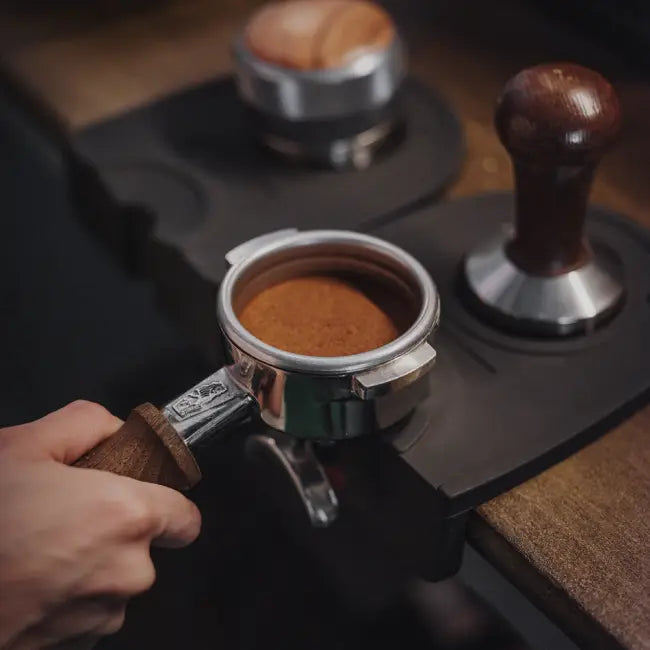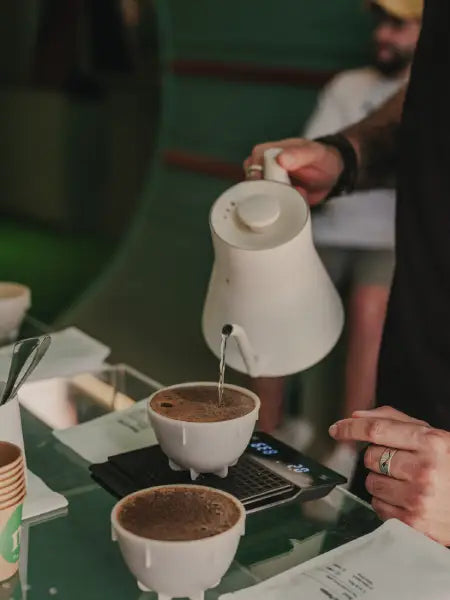Guanacaste
Get to know this coffee in detail
Rodolfo Ruffatti's Guanacaste farm seeks to fulfill the same purpose in a place where financial speculation and climate change have wiped out all coffee farms.
Guanacaste is the name of a very special tree that grows on the Pacific coast of Central America.
It accumulates water in its roots during the rainy season and releases it during the dry season, benefiting all organisms and creating a microclimate around them.
Ruffatti preserves biodiversity and uses growing media that benefit the ecosystem. This is evident in the quality of its cherries, which undergo a 120-hour anaerobic fermentation process.
They are then left to dry on raised beds until the desired humidity level is reached. This is what we call natural anaerobic fermentation coffee.Meet the producer
Finca Guanacaste Coffee against climate change

Guanacaste is the name of one of the Ruffatti family's farms in El Salvador (formerly known as Finca Lombardía). Located 1,000 meters above sea level, it has been used for coffee cultivation since 1970.
The Guancaste farm is located in the Santa Ana region, where coffee has traditionally been grown. It is now one of the few remaining farms in this region that maintains this type of cultivation. This helps maintain the biodiversity necessary for coffee plants to grow in optimal conditions.
The origin of the Guanacaste farm

The Ruffatti family immigrated from Italy to El Salvador around 1934 to dedicate themselves to coffee farming and purchased their first farm, called "El Salvador." In 1970, they purchased the Lombardía farm (now known as Finca Guanacaste), in the Santa Ana region.
At that time, almost all of the plantations in this region were dedicated to coffee cultivation. Since then, coffee profits have fallen dramatically, driven by speculation in the financial markets. As a result, many coffee growers have had to switch to corn.
From coffee to corn (and the effects this has had)

The shift from coffee to corn cultivation has had disastrous consequences for the environment in this region. Coffee cultivation requires biodiversity and vegetation that create a microclimate and shade trees. Soil quality is also very important, and for this, a rich variety of vegetation and a balanced ecosystem are essential.
Due to the limited profits from coffee cultivation in recent years, many coffee farmers in this area have had to abandon this crop and switch to corn. To do so, they have burned large areas of forest and vegetation previously used for coffee cultivation, leading the region to progressive desertification. Furthermore, corn monoculture requires pesticides and chemicals that impoverish the quality of the soil and its chemical biodiversity. All this is because coffee is a product bought and sold on financial markets, and its price is speculated on in futures markets.
The Guancaste farm is committed to specialty coffee.

To combat this, the Guanacaste farm has opted for specialty coffee and direct contact with roasters. Specialty coffee cultivation requires biodiversity and a balanced ecosystem, which is why the Guanacaste farm remains a bulwark against desertification and a striving to protect the environment.
Furthermore, specialty and direct-trade coffee results in higher profits for local producers, allowing them to live more dignified lives and continue to maintain this type of farming that benefits the environment and all of us. Rodolfo Rufatti, grandson of the man who introduced the Ruffatti family to coffee farming in El Salvador and who now runs the family business, is introducing more biodiversity to the farm, which indirectly also benefits the quality of the coffee.
Coffee processing at the Guanacaste Farm

At the Guanacaste farm, coffee is processed using the "natural" method. This means that the coffee cherries, once picked, are left to dry on beds until the desired moisture content is reached before being pulped. This method gives the resulting coffee a fruity yet clean, balanced, and sweet profile. Each lot is individually and carefully processed by the Productor Coffee team under the supervision of Rodolfo Ruffatti.
The process of anaerobic fermentation

Anaerobic fermentation is a culinary process widely used with other foods and beverages, such as wine. It involves allowing fruit, in this case coffee cherries, to ferment in hermetically sealed tanks to keep out oxygen. These tanks also have a valve to expel any remaining oxygen.
Inside the tanks, naturally occurring microorganisms will begin to break down glucose molecules, a chemical reaction that generates CO² and heat. This will displace oxygen in the tank and expel it through the one-way valve. The bacteria naturally found in the coffee cherry and in the mucilage produce enzymes during this process, which are what lead to the generation of less complex compounds, such as organic acids and alcohol.
Why anaerobic fermentation is used and how it is done

Anaerobic fermentation impacts the coffee's organoleptic profile. This can modify this profile to enhance some of its qualities. Once picked at their peak ripeness, the cherries are left to ferment in hermetically sealed tanks for 120 hours. In the case of this particular coffee, the process is carried out in plastic bags; this may vary for each producer.
Cherries can be fermented pulped or unpulped, depending on the post-fermentation process. Washed, natural, or honey are the most common. For this natural batch, the unpulped cherries are left to dry until the desired moisture level is reached, for approximately two weeks. During this time, they must be turned regularly to ensure even drying.






